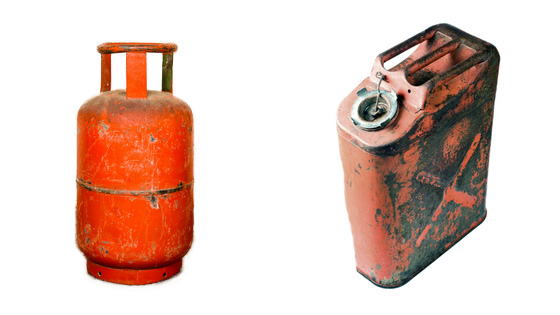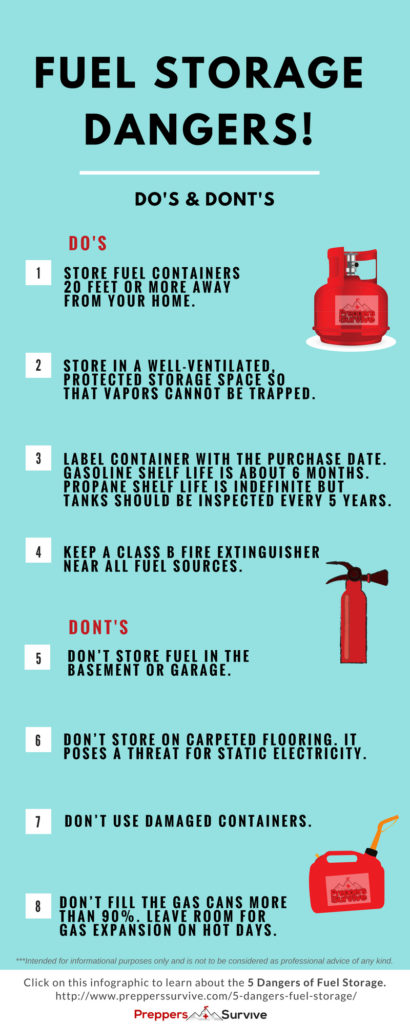
Fuel is the critical component to the operations of many businesses and industries. If you are an employee of such an enterprise, then you may be familiar with fuel safety and storage regulations. There are many safety codes concerning how to store fuel. Whether you’re at home or work storing fuel is risky. In fact, it could even kill you. The 5 dangers of fuel storage are often underestimated. While the use of fuel is a common thing in most companies and households, storing it comes with some risks. Here are five dangers you should be aware of.
5 Dangers of Fuel Storage
1. Beware of vapors! Don’t store fuel in garages or basements!
Most fuels produce very hazardous vapor which can be very dangerous to humans. As compared to air, gas vapors are heavier. When they are released, their fumes travel downward and concentrate on areas found in a closed environment. For this reason, you should never store fuel in a garage or basement. Something as small as a water heater or engine spark can easily cause a fire. Another risk of fuel vapors is breathing them. Avoid prolonged exposure to fuel vapors. Breathing vapors from gasoline can cause asphyxiation and death.
According to OSHA, propane tanks should be stored at least 20 feet away from your house in open-air and stored in a way that protects them from accidents such as getting dropped or hit. It’s recommended to get old propane tanks inspected by a professional, every five years.
2. Beware of potential explosion!
Explosions can also result from stored fuel. There are many cases of plastic portable gas containers exploding, resulting in 80 lawsuits in recent years. Explosions caused by fuels can be caused by excessive heat, vapors exposed to an ignition source, or direct contact with fire. A single spark can make a leaky propane tank or gas can explode. The vapor produced with just a single cup of gasoline can produce the same force that five pounds of dynamite produce.
Get gas cans with a flash arresting screen. A flash arrest screen is a mesh cylinder made from metal that prevents explosions. This is a mandatory safety procedure on any job site. Do not store your fuel cans on surfaces that can create static electricity such as carpet.
Learn more about emergency fuel services here.
3. Beware of inadvertent exposure!
Children like to experiment, putting them at high risk if they decide to play with fuel you’ve been storing. Adults can also inadvertent expose themselves. Many people don’t know that when skin comes in direct contact with propane, they will get instantaneous freezer burn.
Learn about the fuels you store on your property and educate family members on the safety procedures and hazards of each fuel. Also, wear gloves when connecting propane tanks.
4. Beware of the fire risks!
Whether its petrol or gasoline all types of fuel are highly flammable. For instance, gasoline is a highly flammable liquid. This means it can be more destructive than you think. Flammable liquids burn very hotly causing other organic material to ignite nearby. Any fire outbreak can spread quickly, creating the potential for smoke inhalation, cutting off exit paths.
Keep a Class B or ABC Fire Extinguisher near all fuel sources. Keep tanks and gas cans away from direct sunlight.
5. Beware of transporting hazards!
The risk of exposing fuels to static electricity, sparks, or damage to the containers are high when transporting fuels. Transporting fuels can be hazardous if they are not properly packed and sealed. Damaged gas containers can leak gas or release vapor that can lead to explosions.
There are many regulations regarding transporting fuel. Research and follow the safety precautions to limit potential dangers.
Overall storing fuels in the house or business can be risky but stored correctly and following professional guidelines can help to reduce that risk significantly. In severe cases, improperly stored fuels can lead to injuries, loss of life, and even the destruction of an entire building.
Guest Post – Leona is part of the content and community team at Specialty Fuel Services – providers of emergency fuel continuation services, in locations affected by catastrophic events.
Thanks for visiting Preppers Survive. Before you leave subscribe to our newsletter. If you enjoyed this article, please share it on your favorite social media.



Be aware of everyday SHTFs … in regard to fuel storage – don’t violate the local zoning codes in both storage methods and volume – same with your restrictions that govern your homeowner’s insurance policy …
Generally good information, Kinda logical..mostly…sort of.
“..they will get instantaneous freezer burn.” ??
A bit overstated really.
Propane liquid is contained under pressure which allows
it to normalize it’s temperature.
Entropy, who knew?
Rapid decompression is when it gets cold.
In practical terms though, the amount of gas escaping in order to cause “instant freezer burn” would a be a rather frighteningly loud event.
A very real danger that will almost never happen.
The more imminent danger in such a situation where enough decompression occurs would be an explosion hazard.
The loud hissing would be very unnerving…causing most people to run.